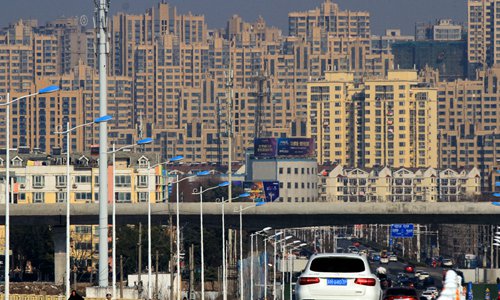
A view of newly-built residential buildings in Changzhou, East China’s Jiangsu Province File photo: VCG
A draft real estate tax law is being optimized by relevant departments, which will be submitted for legislators’ review when conditions are right, senior Chinese officials said during the two sessions on Saturday.
“Relevant departments are discussing ‘important issues’ about the law, and when the conditions are ripe, it will be submitted to the Standing Committee of the National People’s Congress (NPC) for initial review,” Uzhitu, vice chairman of the Financial and Economic Affairs Committee of the NPC, told a press conference.
Liu Junchen, vice chairman of Legislative Affairs Commission of the NPC, also said during the conference that work on the draft real estate tax law is “progressing steadily.”
Experts said that the progress marks a crucial step forward in China’s real estate tax reform. The law will be one of the long-term systemic changes intended to ensure sustainable development of the real estate market.
China has discussed the property tax plan for some time. It launched pilot programs in Shanghai and Southwest China’s Chongqing as early as 2011. However, a nationwide plan has never materialized as its sudden implementation is likely to shake the real estate market – a pillar of the national economy.
The move to develop such a law also shows the central government’s det++ermination to curb speculation and promote the sound development of the real estate market amid downward pressure on the economy, experts said.
China will prudently advance legislation on a real estate tax, according to the Government Work Report released on March 5. It also said that China will better address people’s housing needs and sustain the steady and healthy development of the real estate market, according to a report from the Xinhua News Agency.
“Although housing prices in major cities have dropped in response to regulatory tightening measures, the lack of a property tax has also been an obstacle for the country’s push for other tax reforms,” Yan Yuejin, a research director at E-house China R&D Institute, told the Global Times on Sunday.
Yan said property taxation wouldn’t have much impact on those who have a “real demand” to purchase a house, but it will raise the cost of speculation and help squeeze out price bubbles.
He noted that it will still take some time for the law to be finally rolled out, and the move might affect a number of households in China, which creates a dilemma for the policymakers.
Experts said that China can also turn to overseas examples, such as the US, which could offer some guidance.
[“source=globaltimes”]

